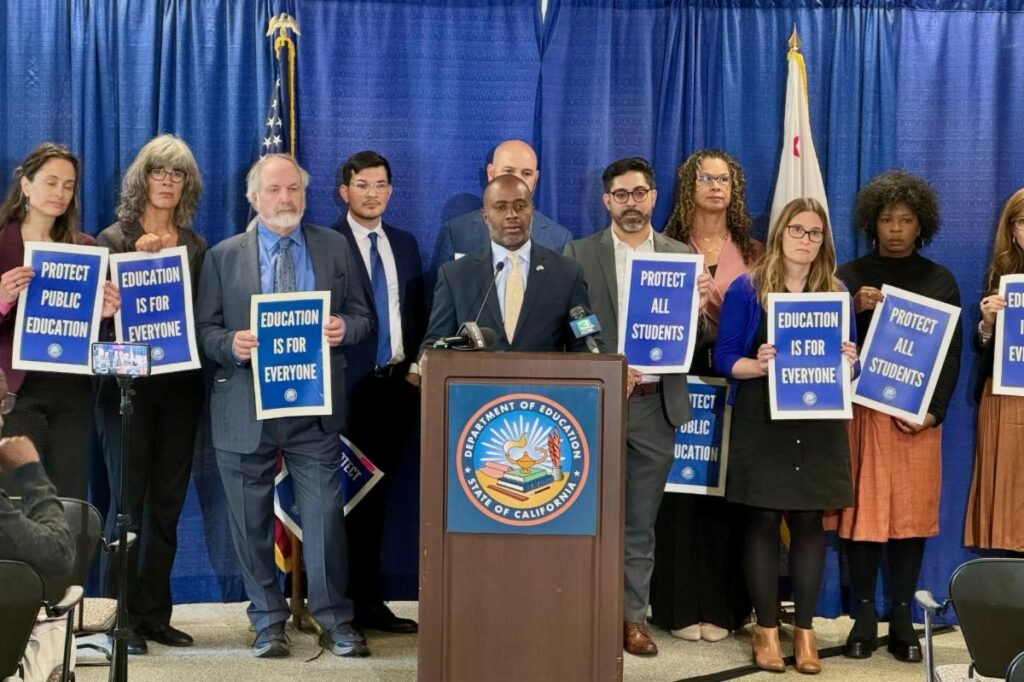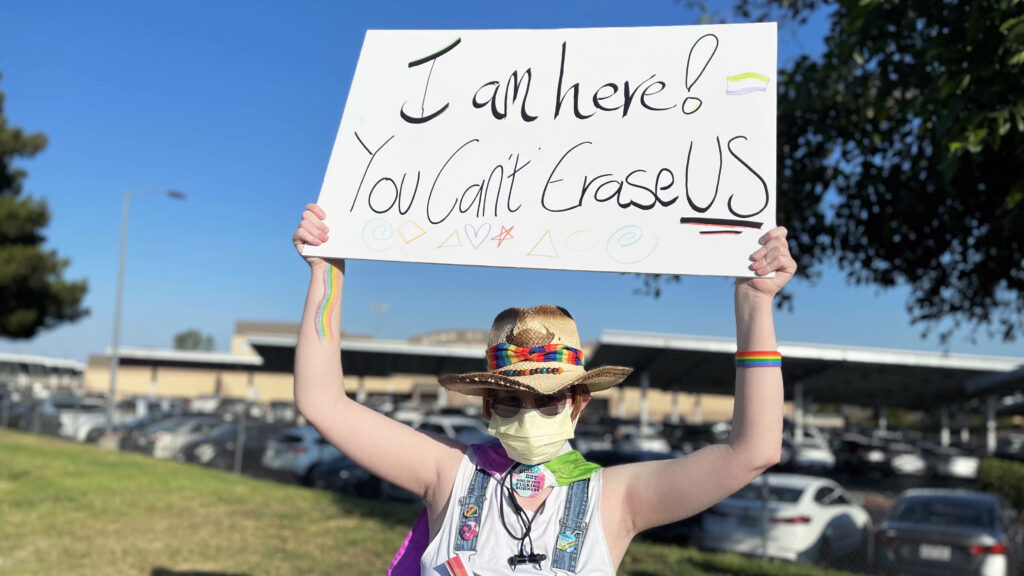
Flanked by fourth-place winner Ellie McCuskey-Hay, left, and first-place winner Loren Webster, right, second-place winners AB Hernandez, center right, and Brooke White share the podium during a medal ceremony for the long jump at the California high school track and field championships in Clovis.
Credit: AP Photo / Jae C. Hong
Top Takeaways
- California Department of Education vows to protect “all students’ access to participate in athletics in a manner that is consistent with their gender identity.”
- Sixteen-year-old transgender athlete AB Hernandez shared three medals with cisgender competitors under newly rejiggered rules at California’s track and field championships last weekend, sparking controversy.
- The U.S. Department of Justice warned California schools they may be held in violation of civil rights protections for girls.
The California Department of Education on Tuesday weighed in on the escalating controversy over transgender athletes in school sports, advising schools to hold the line in the wake of threats from the federal government.
The U.S. Department of Justice on Monday issued a letter warning California school districts they will face legal trouble if they don’t pledge to bar trans athletes from competition by June 9, citing civil rights concerns. The CDE countered Tuesday, advising schools to hold fast and let it respond to the Justice Department regarding matters of gender identity on behalf of the state.
“Let’s be clear: sending a letter does not change the law,” said State Superintendent of Public Instruction Tony Thurmond in a statement. “The DOJ’s letter to school districts does not announce any new federal law, and state law on this issue has remained unchanged since 2013. California state law protects all students’ access to participate in athletics in a manner that is consistent with their gender identity. We will continue to follow the law and ensure the safety of all our athletes.”
Last weekend’s fracas over California’s track and field championships in Clovis has become a flashpoint in the Trump administration’s campaign to target transgender athletes in girls sports, a divisive hot-button issue that conservatives have pushed aggressively of late.
President Donald Trump has threatened financial penalties for California public schools after a 16-year-old trans athlete, AB Hernandez, won three medals in last weekend’s California Interscholastic Federation State Track and Field Championships. Hernandez placed first in the high jump and triple jump and finished second in the long jump.
In the wake of a key last-minute rule change, Hernandez shared the podium with her cisgender competitors. The hastily rejiggered rules allow girls to receive medals based on where they would have finished if a transgender athlete had not been allowed to compete.
This compromise did not mollify the president.
“Biological Male competed in California Girls State Finals, WINNING BIG, despite the fact that they were warned by me not to do so,” Trump wrote in a 12:56 a.m. ET post on June 2. “As Governor Gavin Newscum fully understands, large scale fines will be imposed!!!” he added, referring to Newsom.
Harmeet Dhillon, assistant attorney general for the Department of Justice’s Civil Rights Division, argues that letting transgender athletes into girls sports competitions constitutes sex discrimination, violating the Equal Protection Clause of the 14th Amendment.
“Scientific evidence shows that upsetting the historical status quo and forcing girls to compete against males would deprive them of athletic opportunities and benefits because of their sex,” Dhillon has said. “Therefore, you cannot implement a policy allowing males to compete alongside girls, because such a policy would deprive girls of athletic opportunities and benefits based solely on their biological sex.”
The Civil Rights Division has also announced investigations into the University of Wyoming and Jefferson County Public Schools in Colorado for allegedly allowing males to live in intimate and communal spaces earmarked for females.
Town leaders in Clovis, the largely conservative city in Central California that hosted the track and field championships, called it unfair to include a transgender athlete in girls sports, The Fresno Bee reported. Chino has also filed a lawsuit on the issue.
California is among 22 states with laws that allow transgender athletes to compete with girls. Amid the state’s nearly 6 million TK-12 public school students, experts say, the number of active transgender student-athletes is estimated to be in the single digits.
Newsom, a potential 2028 presidential contender who has often jousted with Trump on social issues, shocked many on the left when he admitted that he felt allowing transgender athletes to compete against girls was “deeply unfair” during a recent interview with conservative commentator Charlie Kirk.
While Newsom himself has not as yet weighed in on this specific controversy, Izzy Gardon, a spokesperson for the governor, has praised the new rules as “a reasonable, respectful way to navigate a complex issue without compromising competitive fairness — a model worth pursuing.”
For her part, Hernandez, a junior at Southern California’s Jurupa Valley High, has been characterized as poised and unruffled amid the heated controversy.
“We could not be prouder of the way this brave student-athlete conducted herself on and off the track,” said Tony Hoang, executive director of Equality California, the state’s LGBTQ+ civil rights organization.




